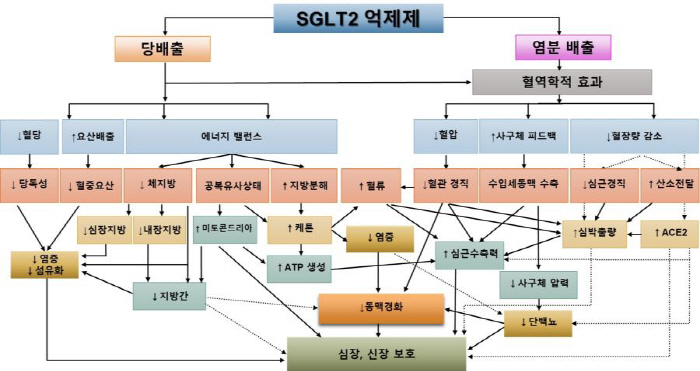SGLT2 inhibitors that lower blood sugar, protect heart and kidney...a key treatment for increasing survival rates
Nov 03, 2025
|
This paper synthesized and analyzed representative clinical trials and studies published over the past decade on the subject of a sodium-glucose cotransporter (SGLT2) inhibitor, and presented the basis that SGLT2 inhibitors have been established as a key diabetes treatment beyond simple blood sugar control agents in diabetics.
Review papers often request authoritative experts to write in order to suggest the academic flow of a specific field and future research directions. This thesis was co-written with Professor Lee Yong-ho (1 author) of Endocrine Medicine at Severance Hospital and Professor Melanie Davis (co-corresponding author) at the University of Leicester in the UK, and the publication of the final thesis as a corresponding author in the world-renowned Nature Review means that Professor Lim Soo is internationally recognized in the field of SGLT2 inhibitor research.
SGLT2 inhibitor is a type 2 diabetes treatment developed as a mechanism to suppress the reabsorption of glucose in the kidneys and lower blood sugar by excreting sugar in the urine. Moreover, several large-scale studies have demonstrated the effectiveness of reducing hospitalization and cardiovascular mortality in heart failure patients and delaying renal function deterioration in chronic kidney disease patients, greatly expanding the range of drug utilization.
Accordingly, the research team synthesized and analyzed representative studies to summarize the mechanism of action and unresolved areas of SGLT2 inhibitors in the latest version. First of all, it was emphasized that SGLT2 inhibitors will play a role as a comprehensive yet key antidiabetic agent in simple hypoglycemic agents. It is a key metabolic treatment that increases the survival rate of diabetic patients by treating and managing heart failure and renal failure, which are major complications of diabetes.
In addition, the research team explained that taking SGLT2 inhibitors causes a complex and multi-layered mechanism in which sodium and glucose are discharged from the kidneys without being reabsorbed. For example, as salt is discharged ▲ blood pressure decreases ▲ glomerular feedback increases ▲ plasma volume decreases, and as sugar is discharged ▲ blood sugar decreases ▲ uric acid emissions increase ▲ energy balance strengthens, finally protecting the heart and kidney.
However, the research team was wary of blind faith in SGLT2 inhibitors. The correlation between SGLT2 inhibitors and cerebrovascular diseases reported in some studies is not yet definitive, and there are positive possibilities in other areas such as gout relief due to decreased uric acid levels, delayed cognitive decline, and reduced atrial fibrillation, but sufficient evidence has not yet been established for clinical application.
Professor Lim Soo, the author of the study, said, "This final paper is a compilation of clinical evidence accumulated over the past 10 years. "SGLT2 inhibitors are no longer just hypoglycemic agents, but are key treatments that slow the development and progression of various diabetes complications such as heart failure and renal failure, increasing patient survival rates and improving quality of life." he said.
Professor Lee Yong-ho of Severance Hospital, the first author of the study, said "Diabetes causes and worsens fatty liver due to increased insulin resistance and high blood sugar. Taking SGLT2 inhibitors improves insulin resistance and mitochondrial function and lowers the risk of fatty liver through anti-inflammatory action."Considering this, SGLT2 inhibitors could be a key drug in a new treatment paradigm that encompasses cardiovascular, kidney, and metabolic domains."," he said.
|
This article was translated by Naver AI translator.















